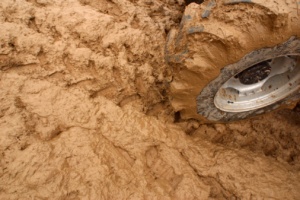 All mud is not the same. No, this is not some great maxim uttered by a wise sage with a long white beard, but in the universe of mud tires, it is everything.
All mud is not the same. No, this is not some great maxim uttered by a wise sage with a long white beard, but in the universe of mud tires, it is everything.
Mud is as variable and changeable as the off-road vehicles trying their best to work through it. Mud is earth and water, sandy soil, topsoil, clay, ice and snow, bogs and peat moss, rocks and gravel. Suspension andtraction-aid devices are key, but mud tires are vital. So, as your tires try to find traction through mud terrain, how can you assess mud and choose the best equipment and approach?
Narrow mud tires, for example are best when you find yourself in mud with a hard bottom layer, as they can cut through the top layer to find traction on the hard surface below. Wide mud terrain tires in this situation tend to float or "hydroplane" on the slick top layer, unable to penetrate the surface.
Wider mud tires do better in thicker, cement-like mud, particularly with variable terrain below the surface. These tiresoffer some flotation, almost like driving in sand. Wider tires too benefit from lowered tire pressure, and give a larger contact patch overuneven terrain. Tire size and sidewall stiffness determine how much you reduce your tire pressure, or'air down'. Common air-down recommendations for average mud tires is roughly 15 to 20 PSI. Airing downgets you added traction when mud seems bottomless and traction is hard to find.
Mud tire tread pattern is vital. Mud tires by definition are tires that have a larger lug and wider, deeper space (voids) between lugs. These voids are designed to channel mud out of the tread and self-clean the lugs. Mud tires grab onto anything it can hook one of its lug edges around, especially when aired down and channellingmud away from the center. Tread design varies widelymakes or breaks a mud tire. A poorly designed mud tire will become clogged and packed with mud in the voids,giving them next to zero traction.
Understanding differences inmud tires will help you negotiate the toughest situation. In the end a good set of mud tires with self-cleaning lugs are key, but always have a backup plan with good recovery equipment.
What else can I help you with?
Mud Tires?
form_title= Mud Tires form_header= Get mud on your tires. What size tires do you need?*= _ [50] Do you want an extended warranty on your tires?*= () Yes () No What is your budget for mud tires?*= _ [50]
When was Mud on the Tires created?
Mud on the Tires was created on 2003-07-22.
Do mud tires cost more than snow tires?
From what I know, they probably do not because snow tires have special pins build into it for gripping the snow/ice. It depends on the type of tire you are actually going to buy but generally mud tires are more expensive than snow tires.
How are mud tires made differently from regular tires?
Mud tires and regular tires have different functions for cars or trucks. Mud tires are specially created for mainly trucks to drive through various kinds of mud. There are multiple types of mud tires designed for the type of mud to consumer is planning on coming in contact with. There is thick cement mud and slick hard bottom mud. If you were to attempt to drive through the mud using regular tires, you would more than likely get stuck. Regular tires are more for cars and the road. Although , regular tires can be used in stormy situations such as, rain , hail, sleet, and snow; They are not specially made to drive through large amounts of mud that mud tires can drive through.
How much do mud tires cost?
There are many kinds of mud tires. They cost about twice as much as road tires in general
When was Mud on the Tires - song - created?
Mud on the Tires - song - was created on 2004-09-13.
What are mud tires used for?
Mud tires are used for driving in the mud or in sand. They keep a truck for getting stuck and digging a hole in the road.
Which studded tires are good for mud and snow driving?
Aluminum studded tires are great for mud and snow.
Where can I buy Mud King tires online?
There are many places online will give honest review on Mud King tires. You can find some of these places at MudTires.BizRate.com or www.NexTag.com/Mud-King-Tires
Would a car's tires have good traction in deep mud?
No they wouldn't. You need deep groove tires for mud
Where can I get mud tires online?
Sears and Tirepackage are two online stores that you can find cheap prices on mud tires.
Does BF Goodrich offer a line of off road tires?
BF Goodrich does offer a line of off-road tires. The name of these tires are know as Mud Terrain. They are the latest in rugged off-road tires.
